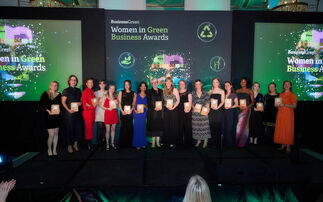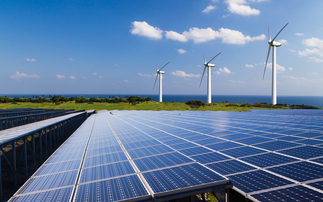Ahead of next week's Net Zero Nature Summit, Sarah McDonald, vice president of sustainability at GSK Consumer Healthcare, reveals how the company is collaborating on a call to action to ensure climate and health strategies are better aligned
To be healthy, people need a healthy world to live in but unfortunately, the health of the world is under threat. Increasing scientific evidence demonstrates climate change and nature loss are impacting the world and human health in many ways through rising temperatures, including air pollution, water scarcity and plastic pollution.
Core to our corporate strategy, GSK Consumer Healthcare is tackling the environmental and societal barriers between the planet's health and our human health in order to increase the urgency and ambition of actions to tackle climate change. This is a problem that disproportionately limits people's opportunities for everyday health and wellbeing through, for example, greater exposure to air pollution or longer and more acute episodes of illnesses such as allergies or flu.
With climate change and public health challenges inextricably linked, this presents one of the most significant public health challenges we face. The effects of climate change are already causing premature death and worsening health outcomes for many around the world and the expected direct financial costs are predicted to be $2-4bn per year by 2030. There is also a critical social equity dimension to the climate and health nexus which all actors from business to government would benefit from understanding in greater depth.
The medical community and healthcare businesses have recently been exploring these connections and are starting to act and advocate for others to do the same. However, for many non-health businesses, the investment community, and politicians, the connections between climate and health are less clear, and are often neither meaningful nor tangible.
As Richard Ellis of Walgreens Boots Alliance noted, "the links between climate and health are so profound - especially in relation to air pollution, but we're currently treating them as separate issues. What we do in the next year will determine whether we build climate and health systems that are resilient - including building resilience to the impacts of air pollution, but also tackling the root causes of air pollution in ways which can also drive connected benefits for health."
What's already happening and what's missing?
Many businesses have climate policies, with 2,162 businesses and 160 investors responsible for over $70tr assets signed up to the Race to Zero and 1,366 businesses setting Science Based Targets (SBTi); many also have health and wellbeing strategies, particularly in the food sector. But the activities and approaches are not often linked nor are core to business, while opportunities are missed to accelerate progress in both.
Even within the healthcare sector it isn't always clear how best to approach interventions in these two interconnected systems, and to activate strategies for both. There is also a lack of shared pre-competitive spaces or guidance around what actually works. For non-health sector businesses, the case for acting and potential outcomes are particularly unclear and hard to engage with.
What do we want business to do differently as a result?
At the Net Zero Nature Summit on the 27th May, GSK Consumer Healthcare will reveal how it is collaborating with Forum for the Future, Walgreens Boots Alliance, and other important healthcare and non-healthcare stakeholders to galvanise business actions around the intersection of climate and health - with a particular focus on the challenge of air pollution. We are using COP 26, and events that lead-up to the Glasgow Summit, to support a call to action for business to respond to the climate and public health crisis in ways that drive systemic change.
We will host a panel to shine a light on the connections between air pollution, climate, and health, and advance understanding of what different high-risk populations are seeing and feeling. We will use the panel discussion to identify how GSK Consumer Healthcare and other stakeholders can drive positive benefits for health and climate - including by working together to mitigate the impact of air pollution. We will identify where action is already happening and how this can be accelerated or scaled up and agree on any areas where organisations can work together to accelerate progress in climate and nature.
Following these discussions, we will help to shape and support a Call to Action convened by Forum for the Future for businesses to respond to the climate and public health crisis in ways that drive systemic change towards positive climate and health outcomes. Offering clear guidance on what practical actions businesses can take to drive change in both challenges simultaneously, as well as reinforcing the powerful role that health can play in accelerating action on climate - we aim to use COP 26, and events that lead-up to the Summit to amplify this Call to Action. We hope that you'll join us.
Sarah McDonald is vice president of sustainability at GSK Consumer Healthcare
GSK Consumer Healthcare is a partner of the Net Zero Nature Summit and Net Zero Festival
Further Reading
Business Leadership Brief on Healthy Planet Healthy People
An empowering business narrative and call for health resilient climate action








